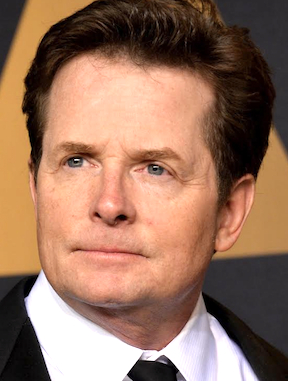On this date in 1961, actor Michael Andrew Fox, known professionally as Michael J. Fox, was born in in Edmonton, Alberta, to Phyllis (née Piper), an actress and payroll clerk, and William Fox, a police officer and Canadian Forces member. After starring in the Canadian TV sitcom “Leo and Me” at age 15, he moved to Los Angeles.
Playing Alex P. Keaton on NBC’s popular “Family Ties” (1982-89) earned him three Emmy Awards and a Golden Globe. Producer Brandon Tartikoff opposed casting Fox because, according to Fox’s 2002 memoir Lucky Man, “How could someone that short (5’4″) have Michael Gross and Meredith Baxter Birney as his parents?”
He married “Family Tiies” co-star Tracy Pollan in 1988. They have four children: son Sam (b. 1989), twin daughters Aquinnah and Schuyler (b. 1995) and daughter Esmé (b. 2001). Pollan is Jewish and the children were raised in Reform Judaism.
Fox’s later roles, including on the ABC sitcom “Spin City” (1996–2000), brought him two more Emmys, three more Golden Globes and two Screen Actors Guild Awards. He had earlier adopted the middle initial J as a tribute to character actor Michael J. Pollard (C.W. Moss in “Bonnie and Clyde”). He starred in the feature film “Back to the Future,” which became a trilogy.
Numerous other movie roles include “Doc Hollywood,” “Bright Lights, Big City,” “For Love or Money,” “The American President” and “Mars Attacks!” His last major film role was in “The Frighteners” (1996). He was diagnosed with Parkinson’s disease in 1991 at age 29 and disclosed his condition to the public in 1998.
Since 1999, Fox has worked mainly as a voice-over actor. He founded the Michael J. Fox Foundation for Parkinson’s Research in 2000. It has raised over $1 billion for research. He has written three books besides Lucky Man: Always Looking Up: The Adventures of an Incurable Optimist (2009), A Funny Thing Happened on the Way to the Future: Twists and Turns and Lessons Learned (2010) and No Time Like the Future: An Optimist Considers Mortality (2020).
In No Time Like the Future,” Fox wrote that he is not a “subscriber to any particular orthodoxy,” called optimism “my faith” and said “I’m beginning to see that faith, or fear’s opposite, can be expressed as gratitude, which has always been the bedrock of my optimism.”
“Parkinson’s and alcohol took a sledgehammer to any illusions I may have had that I was in control. I came to accept that any disease or condition beyond my control is, in effect, a power greater than myself,” Fox wrote in Always Looking Up.
“To survive this destructive energy, I must look to an even higher power. For my purposes, I need neither define it nor have others define it for me, only accept its existence. It is evident in Tracy’s love and inexhaustible friendship, the toothless gap in Esme’s smile, Aquinnah’s grace, Schuyler’s grit, Sam’s intrepid curiosity. So much to savor, so much to be grateful for.”
PHOTO: Fox in 2017 at the 89th Annual Academy Awards in Los Angeles; Featureflash Photo Agency / Shutterstock.


